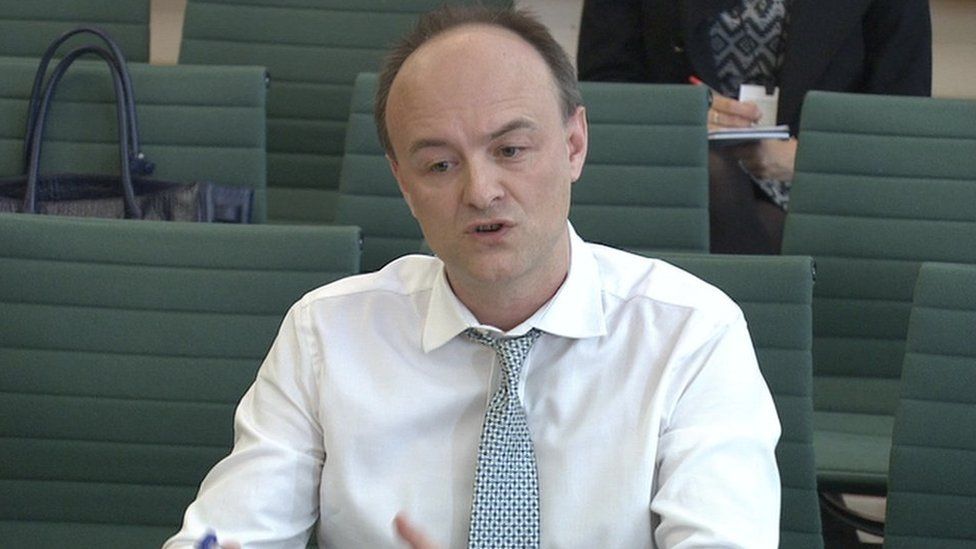Vote Leave's Dominic Cummings 'in contempt of Parliament'
- Published

Vote Leave director Dominic Cummings should be reprimanded for refusing to take part in a parliamentary inquiry into fake news, MPs have said.
The Privileges Committee said Mr Cummings had committed a contempt of Parliament by not appearing to give oral evidence when ordered to in 2018.
The Digital, Culture, Media and Sport Committee wanted Mr Cummings to respond to allegations made against Vote Leave.
Mr Cummings said he had offered to give evidence under oath but was ignored.
In a post on his blog, the former Vote Leave director said: "My offer to give evidence to MPs remains open.
"As does my reasonable demand that all of us are under oath to tell the truth. I hope they take it up but am not hopeful."
Last year, Mr Cummings responded to the summons in a post on his blog, in which he said he had explained he could not attend on the dates requested and that there were "legal issues" because of a separate inquiry by the Electoral Commission.
In its report, the Privileges Committee said Mr Cummings had first been invited and then ordered by the DCMS committee to give evidence as part of its inquiry into fake news, which he failed to comply with.
At the time, the DCMS committee said it wanted Mr Cummings to respond to "allegations made against the Vote Leave campaign during our inquiry" and to "clarify allegations about the unlawful coordination of EU referendum campaigns".
A summons to attend resulted in a comment from Mr Cummings which said: "I withdraw my offer of friendly cooperation, given you will have shown greater interest in grandstanding than truth-seeking, which is one of the curses of the committee system."
The report said that, in summary, there were three key reasons given by Mr Cummings for his absence:
- There were legitimate reasons why Mr Cummings could not attend the suggested dates
- There were "legal complications" because of investigations by the Electoral Commission and the Information Commissioner's Office and because of the possibility that criminal charges might be brought against Mr Cummings
- The committee was biased in its approach
In its examination of these reasons, the Privileges Committee said Mr Cummings had been offered a series of dates for a hearing and he had not supplied any evidence which suggested he was at significant risk of prosecution.
It said the fact that a prospective witness takes a different view on policy or political issues from a committee does not constitute grounds to refuse to appear.
The committee said it had "no doubt" Mr Cummings "would have given robust and articulate responses" had he attended.
"Attending the hearing and defending his position when called upon to do so would have been the right thing to do," the committee said.
It said his refusal to attended "constitutes a significant interference" with the committee's work and it rejected Mr Cummings's arguments.
"We conclude that Mr Cummings committed a contempt both by his initial refusal to obey the DCMS Committee's order to attend it and by his subsequent refusal to obey the House's Order of 7 June," the committee concluded.
"We regret the tone which Mr Cummings adopted in his dealings with the DCMS Committee and in the comments posted on his blog."
The report recommended that the House "should admonish" Mr Cummings for his contempt in the form of a "resolution of the House" - or expression of the will of MPs.
The Privileges Committee said it had received no response from Mr Cummings during its inquiry.
But Mr Cummings says on his blog that he has been in email correspondence with the committee and had offered to give evidence to the DCMS committee, provided everyone was under oath - something, he says, was rejected by the privileges committee in December.
In what he says was his final email to the committee, dated 26 February this year, he says: "I offered to speak to you last summer. You didn't answer for three months. I suggested 31 January. You didn't answer for a month by which time life had moved on. You then wrote saying you didn't want to speak to me any more.
"If you want to speak, then please can we actually fix a date and the MPs answer correspondence in less than geological timescales?"
- Published28 June 2018
- Published7 June 2018
- Published5 June 2018
- Published17 May 2018